Christian Social People's Service
The Christian Social People's Service (German: Christlich-Sozialer Volksdienst) was a Protestant conservative political party in the Weimar Republic.
Christian Social People's Service Christlich-Sozialer Volksdienst | |
|---|---|
| Founded | December 1929 |
| Dissolved | 1933 |
| Split from | German National People's Party |
| Ideology | Conservatism Political Protestantism Christian democracy Populism Agrarianism |
| Political position | Right-wing |
| Colors | Grey |

The CSVD was founded in December 1929 through the merger of two Protestant political formations: the Christlich-soziale Reichsvereinigung (Christian Social Reich Association) and the Christlicher Volksdienst (Christian People's Service). Both had emerged from dissatisfaction amongst Protestants towards the developments within the German National People's Party (DNVP). The two groups differed on many issues, such as the role of the Republic, but were able to keep organizational unity. The CSVD portrayed itself as a Protestant version of the Catholic Centre and was mainly supported by middle-class elements. In the main they were considered to be part of the moderate tendency within the DNVP, as opposed to the radical nationalist leadership of Alfred Hugenberg.[1]
The CSVD contested the 1930 and 1932 parliamentary elections; the party CSVD formed a joint parliamentary group with the Christlich-Nationale Bauern- und Landvolkpartei (Christian National Peasants' and Rural Peoples Party) in the Reichstag. After the Nazi take-over in 1933, the CSVD was dissolved.
The President of the Federal Republic of Germany Gustav Heinemann (1969–74) was a member of CSVD during the Weimar Republic.
References
- Richard Bessel & E.J. Feuchtwanger, Social Change and Political Development in Weimar Germany, Croom Helm, 1981, ISBN 085664921X, p. 277